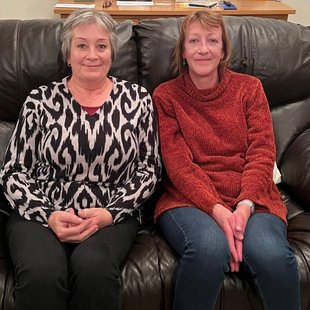Tracey: A quick blood test to find out your BRCA status could save your life

Tracey and her sister Karen
After Tracey’s sister was diagnosed with ovarian cancer, she found out she carries a faulty BRCA gene. Tracey (above left, with her sister Karen) tells her own story of having genetic testing, risk-reducing surgery, and her own unexpected cancer diagnosis.
Two years ago my sister was diagnosed with ovarian cancer. Her only symptom was a lump on her sternum, which turned out to be a secondary from the ovarian cancer which was classified as stage 4b and terminal. She had none of the typical symptoms of ovarian cancer.
Thankfully she reacted much better to chemotherapy than anyone expected and was able to have radical surgery to remove all of the cancer. She had two more sessions of chemotherapy as a "belt and braces" approach, is currently cancer free and taking olaparib tablets.
Her oncologist suggested genetic testing for BRCA gene faults and the test came back that she was positive- she carries a faulty BRCA1 gene.
I had genetic counselling over the phone due to the Covid lockdown. There was no trying to influence me one way or the other, I was sure I wanted to have the test but had to have two counselling sessions to be sure I had considered all the implications.
I wanted to have the test so I could take any action if needed, and I also wanted to know as it could affect my children.
When the genetic counsellor rang to tell me that I was also found to have a faulty BRCA1 gene she was very supportive and told me she was able to talk with me as long as I needed. Even though I'd thought I was prepared, this came as a big shock and I was very upset, not just for myself but also the possible impact on my children.
I decided to have risk-reducing surgery to remove my ovaries and fallopian tubes in February 2022 as I had already had a hysterectomy when I was 40. This was quite an easy decision for me as I had no use for them, and if there was a chance they could become cancerous it seemed the sensible and obvious thing to do. It’s obviously a harder decision for someone of childbearing age or younger.
They always check the ovaries and tubes really carefully when they’ve been removed in this situation.
To everyone's surprise they found early signs of cancer in one ovary and one fallopian tube.
This was very upsetting, especially as I knew what my sister had gone through. I had completion and staging surgery in May 2022. Thankfully no more signs of cancer were found, but my oncologist wanted me to have chemotherapy to ensure any residual areas of cancer were eliminated.
I had six cycles of chemotherapy from July to November 2022. I struggled with the chemo but knew that it was something worth doing. When I saw my oncologist the week before Christmas she was delighted with my progress and discharged me from oncology.
I still have three monthly appointments with the gynaecology team and so far everything has gone well. I am back to doing my normal activities and enjoying catching up with friends and family and travelling. I’m also spending time with my 6-month-old grandson.
Knowing I was going to become a grandma was certainly helpful in remaining positive during my treatment.
We had no history of ovarian or breast cancer in our family, or knowledge of the BRCA gene. My dad had prostate cancer but he was in his late 70's when diagnosed and wasn't tested for BRCA gene faults at the time. He has subsequently tested positive for the BRCA1 gene fault too. Genetic testing is also available for our children when they wish to have it, along with our cousins who have all tested negative so far.
Because we carry a faulty BRCA1 gene we are part of the high-risk breast screening programme which means we have a breast MRI and mammogram each year. My daughter is also eligible for this due to myself and my sister being BRCA1 positive even though she has not yet had the genetic test.
My oncologist said that my sister "may have saved your life".
If I hadn't had the risk reducing surgery the cancer wouldn't have been found until much later and the outcome could have been very different.
I consider myself fortunate to have been identified so early and as such to have to have less invasive surgery and chemotherapy compared to my sister. If my dad had been offered genetic testing when he was first diagnosed with prostate cancer then my sister and I could have been tested and had risk reduction surgery much earlier, and avoiding chemotherapy and radical surgery.
I would encourage anyone offered genetic counselling to take the opportunity. Don’t worry that you will be pushed to get a test. It is very supportive and gives you all the time and information you need to make the decision that is right for you. It certainly makes you appreciate life.
For a quick blood test to find out your BRCA status it could save your life.
Ovarian cancer can be difficult to detect in its early stages due to many of the symptoms being associated with other illnesses.
We can save thousands more lives by equipping people with the information that can prevent ovarian cancer in those at highest risk and diagnose ovarian cancer in others as early as possible.
To read more about BRCA gene faults and who is eligible for genetic testing, visit our Hereditary Hub